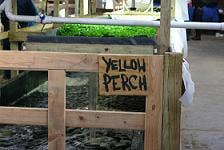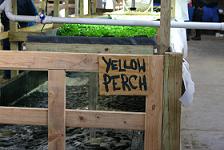The Rise of Urban Aquaponics: Farm Fresh Fish in Wisconsin (Video)

Share
Entrepreneurs in Milwaukee, Wisconsin are working to offset ecological disaster and build up a new model for food production all in one setting. Sweet Water Organics is an urban aquaponics company that raises fish (perch and tilapia) and leafy greens in an old factory. Perch was a staple for the Great Lakes region before an invasive species (zebra mussel) devastated their population. While still small, Sweet Water has already sold thousands of fish and is looking to make major expansions in the next two years. Their fledgling success suggests the potential for aquaponics technology to revolutionize underused industrial space and provide sustainable protein to urban centers. Long term health and ecological problems for the endeavor are still poorly understood, however. Check out a look at Sweet Water Organics from a local Milwaukee show in the videos after the break.
We see a lot of different technologies here at the Hub, but this is really rare - a factory that grows food! That's essentially what the Sweet Water Organics venture into aquaponics has created. Water goes into the abandoned factory and fish and vegetables come out. Imagine replicating that system on a large scale. The industrialized world is full of unused or forsaken urban spaces that could be converted into agricultural spaces that could feed thousands or even millions of people. Sweet Water Organics is a model for how cities could move towards becoming sustainable places to live.
Founders Josh Fraundorf and James Godsil learned their craft in large part from Will Allen, the MacArthur Genius Fellow and leader of Growing Power. Their setup is pretty typical for aquaponics. There are three tiers in the system, two for plants and one for fish. Water pumped to the top makes it through the soil of the first tier of plants. Then it drains into the second tier of plants (greens like watercress), which grow directly in tanks of water. Then the H2O makes it way down to the fish at the bottom. Plant material and water-borne organisms serve to feed the fish. Effluence from the fish is collected, and along with plant material compost, is used to fertilize the plants. Worms process the compost to make it ready for the water based plants.
Aquaponics technology is cool because it's fairly simple. The vegetables and animals live in symbiosis - fish waste fertilizes the plants and the plants clean the water for the fish. Except for small losses to evaporation, the water in the system is self-contained. It's a very efficient setup - all your resources either stay in the warehouse or are carried out as plants and fish. You can see the entire operation in action in the following two clips from Wisconsin Foodie. Because it's a local show, the host explores Sweet Water Organics at a relaxed pace. If you enjoy that great, if not, you won't miss much if you skip around.
Fraundorf and Godsil's ideas sound like a winning formula. Why shouldn't we all get in the aquaponics business? Well, actually many people are. An article on Sweet Water in the Wall Street Journal mentions nearby Bell Aquaculture LLC (with $50 million invested and looking to turn a profit in 2011), but there are others all over the world. With the recent decline of manufacturing in US cities, there are plenty of old warehouses, factories, etc that are ripe for a new aquaponics paradise.
Be Part of the Future
Sign up to receive top stories about groundbreaking technologies and visionary thinkers from SingularityHub.


But that's also a concern in my book. Sweet Water and others may be organic farming (actually Fraundorf and Godsil are still working towards obtaining their organic certification as that takes a while in the US) but that doesn't mean they are toxin free. The reclaimed urban spaces may contain chemicals and trace elements that we can't fully track. We can test for big dangers like mercury and lead, but there are so many more possible contaminants that could be lurking in these spaces. Additionally, wild fish are exposed to a variety of nutrients, and conditions that no aquaponics facility could ever hope to replicate completely. That could affect the nutritional value of these fish in ways that would go undetected. Bottomline, the long term limitations and dangers of urban fish farming are not yet fully understood, and it may take years for us to know if aquaponics is a viable solution for providing healthy fish proteins and plants.
That doens't mean I'm opposed to the work Sweet Water Organics is doing, far from it. I applaud the effort to revitalize urban spaces and promote healthy eating. I just want everyone to enter into this experiment with eyes open. We can do a lot to insure that aquaponics fish are healthy. In fact, because even organic pesticides are dangerous to farmed fish, Sweet Water relies on predator bugs instead. That's awesome. Yet, no effort to increase the world's food supply is going to be 100% safe, and it's better if we try to anticipate and offset these problems before they occur.
Urban agriculture is huge part of city life all over the globe. It's often taken as a matter of course that in non-industrialized nations family animals and gardens are a necessary means of offsetting high food prices. Yet industrialized nations, too, have seen a revival of city agriculture, especially as a means of reclaiming industrial spaces that have become unused. Urban Farming in the US promotes such projects as means of community building and health education, and there are many similar organizations throughout the world. In time, however, such endeavors may move from social justice to economic necessity.
Whether you believe world population growth is going to explode or taper off in the next fifty years, it's clear that in the short term we're going to have more people. They'll need food, and especially they'll need protein. That's where Sweet Water Organics and urban aquaponics come in. Besides producing 150 lbs of greens per week, the Milwaukee company is able to provide a regular harvest of healthy fish protein.
That protein is getting harder to come by. According to the Wall Street Journal, the 1980 harvest of perch in the Great Lakes was around 18.1 million pounds. In 2005 it was just 7.9 million pounds. The reduction was caused, at least in large part, by the invasion of zebra mussels in Lake Michigan. That event devastated the population so much that it lead to the cessation of commercial perch fishing there. This sort of ecological tragedy is being repeated in fisheries all over the world, often due to human causes. The UN recently overviewed these problems with a conference in May, with little hope for success. In the end, it's pretty freakin' tragic that we have destroyed so much of our natural ecology that we have to find other solutions
So, wild fish proteins are dwindling at the same time world population is growing. Sweet Water Organics could help. Started with $500,000 in investments (for the building, hardware setup, etc), Sweet Water is looking use its incoming revenue (perch can sell for $16/lb) to expand. According to WSJ, They are looking to reach 400,000 to 500,000 pounds of perch in the next few years by incorporating two more locations. They're also aiming to produce 800 to 1000 lbs of produce each week.
As we look to technology to increase the world's bounty, we're going to face tough challenges. Genetically engineered animals and plants offer increased yields and marvelous innovations, but also promote narrow gene pools (monocultures, really) and are fraught with intellectual property concerns. Local organic farming might be a better alternative, but it faces great difficulty in becoming economically competitive with industrial agriculture. Urban agriculture is an awesome idea, but it's still new and we're not sure of its limits or dangers yet. Hopefully the years ahead will see us address the concerns for each of these technologies, finding the one (or combination of several) that will best feed the world. Not just in terms of raw quantity, but nutritional quality as well. So, best of luck to Sweet Water Organics and all the other emerging urban aquaponics projects out there. I'll come by for a fish fry if I'm ever in the area.
[image credit: Sweet Water Organics]
[video credit: Wisconsin Foodie]
[source: Sweet Water Organics, Wall Street Journal]
Related Articles

Researchers Break Open AI’s Black Box—and Use What They Find Inside to Control It

This Week’s Awesome Tech Stories From Around the Web (Through February 21)

What the Rise of AI Scientists May Mean for Human Research
What we’re reading
